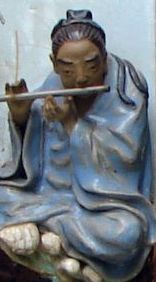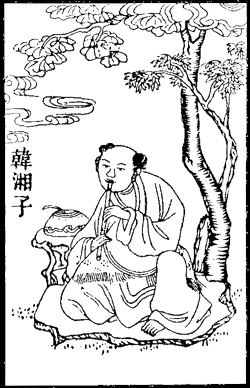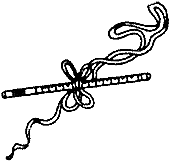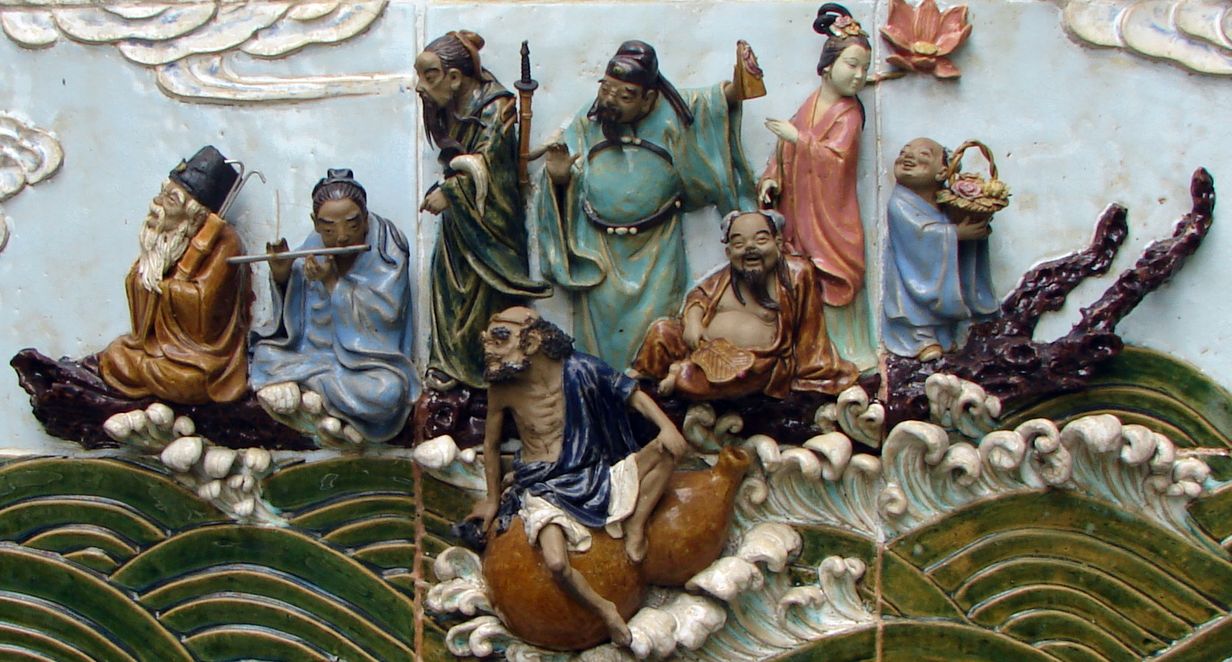
Content created: 2010-12-30
File last modified:
Go to previous or next story,

HÁN Yù 韩愈 = a massively Confucian gentleman, distinguished beyond all measure; inclined to frown
HÁN Xiāngzǐ 韩湘子 = his insufficiently Confucian nephew, also named HÁN Qīngfū 韩清夫
LǙ Gǔpéng 吕谷朋 = a dangerously Daoist teacher
LǙ Dòngbīn 吕洞宾 = an immortal (story 4)
ZHŌNGLÍ Quán 钟离权 = another one (story 3)
Emperor Xiànzōng 宪宗 = a fervent Buddhist, but not a tolerant one

One of the greatest figures in the history of Chinese literature was HÁN Yù 韩愈, a statesman, poet, and essayist of the Táng 唐 dynasty (period 12), whose famous condemnation of Buddhism is admired even today as the definitive Confucian perspective on the subject.
Hán Yù’s brother had a son named Qīngfū 清夫 who was usually known as Hán Xiāng 韩湘 or more often as Hán Xiāngzǐ 韩湘子. He was an intelligent lad, the kind who needed only to look at a text to be able to recite it back from memory.
He was so smart, in fact, that by the time he was about twelve it became difficult to find teachers willing to take him on, for he could recite everything they could and he could excelled even in the less important task of explaining what they texts meant. Worse yet, this difficult lad easily proved himself more clever than one teacher after another in composing staid verses on pious topics.
One day a very presentable but startlingly young man named LǙ Gǔpéng 吕谷朋 applied to teach this precocious young teenager, and to everyone’s surprise, Lǚ Gǔpéng, scarcely more than a teenager himself, knew far more than all the previous teachers combined. He could answer any question, however abstruse, that Xiāngzǐ put to him, and he could pose conundrums that Xiāngzǐ could not resolve. Xiāngzǐ was thrilled. So was everyone else in the family.
“Who would have imagined such wisdom in a teacher so young?!” exclaimed Xiāngzǐ’s father. Even Xiāngzǐ’s famous uncle Hán Yù was so impressed that he briefly stopped frowning.
And so Lǚ Gǔpéng was hired, Xiāngzǐ and his teacher were together constantly, and as time passed Xiāngzǐ grew more and more clever and wiser and wiser.
All of this was good, in its way —reciting ancient texts by rote was the obvious way to fame and fortune, just as it is in some lands today. So was explaining them or writing poems based on them. But his father noticed that Hán Xiāngzǐ was developing an unhealthy interest in exotic topics like the Way, which couild easily distract an impressionable young man from the true path to examination success and a profitable official career.
Upon investigation, it was discovered that Lǚ Gǔpéng had taught his charge to read Daoist texts as well as Confucian ones, and had even taught him how to meditate and how to practice the Way.
Xiāngzǐ’s father was furious, and his famous uncle Hán Yù was three times more furious and frowned even more than usual. They immediately discharged Lǚ Gǔpéng, of course, and had him beaten and chased out of town by hired bullies just to make sure he knew he was not to come back. Mysteriously, Lǚ Gǔpéng had seen that coming and had vanished the night before, just as magically as if he had been the immortal LǙ Dòngbīn 吕洞宾 from story 4. Indeed, perhaps he was! One never knows with Daoists.
But what was to be done with Hán Xiāngzǐ himself, now that his mind had been damaged, perhaps irreparably, by exposure to Daoism? Worse yet, he was now very much a teenager, and his father also knew that at any moment he might become interested in women, and that would be another destructive distraction which must not be allowed to disrupt his path to rich officialdom.
After a great deal of thought, Xiāngzǐ’s father sent him to live with Uncle Hán Yù, where he could be beaten regularly, kept away from women and Daoists, and given a proper Confucian education so that he could pass state examinations and become rich and important like his famous uncle.
Hán Xiāngzǐ did not take after his uncle at all, however. He had no interest in civil affairs or statesmanship, and no interest in books or scholarship or taking civil examinations in hope of appointment to high office. He had no interest in wealth or extravagance. He didn’t even have any interest in women. All of this somewhat puzzled and greatly annoyed his uncle.
Besides the Way, two things that did attract him were magic and wine, so he needed frequent scoldings as he made small objects vanish and appear again, or drank more wine than was meet for a person of the innocence appropriate to the better sort of teenager.
Several years passed, and Uncle Hán Yù's frown grew deeper and deeper.
Finally, when Hán Xiāngzǐ was about twenty, and still shockingly unmarried, he abruptly set out from his uncle’s house on a quest to study the Way.
Some people say that one day he saw an immortal harvesting peaches high in a tree, so he too climbed up, but he fell off and killed himself, or at least he felt as though he had. Of course he didn’t really die; he merely became an immortal, like the one he had seen in the tree, or so he decided.
Soon he met Lǚ Dòngbīn 吕洞宾 and Zhōnglí Quán 种离权, two immortals whom we have met in earlier tales, and they taught him how to practice the Way properly.
Here are some stories about Hán Xiāngzǐ as an immortal:
He had been away a long time, when his uncle’s birthday came up, and he decided, living or dead, mortal or not, that he must return home to join friends and relatives in celebrating. The old man was pleased of course, but also angry, chiding Hán Xiāng for having been away so long. “I’ll bet you have been completely wasting your time,” he grumbled. “Let me see you compose a perfect verse!”
The verse which Hán Xiāng wrote praised the study of the Way, asserting that, as a result of his esoteric studies, he could from nothing produce a chalice of excellent wine, or could suddenly fill an empty vase with magnificent flowers. When he was challenged to fulfill the miracles promised in the poem, he performed exactly these feats, and all the birthday guests gasped in wonder, although Uncle Hán Yù continued to frown.

It was a year of great drought, and as part of his official duties, Uncle Hán Yù set up a Confucian altar and addressed prayers to Heaven for the relief of the drought. But nothing happened.
Hoping to convince his still doubtful uncle of the value of studying the Way. Hán Xiāng donned the robes of a Daoist priest (dàoshì 道士) and wielded a demon-quelling sword. Seeing his nephew so garbed, and noticing that his own prayers had not worked, the old man sarcastically invited Hán Xiāng to try his luck at the altar. Hán Xiāng prayed for three feet of snow. Immediately snow began to fall.
“But how do we know whether this moisture is the result of your prayers or mine?” asked his uncle.
“Because I asked for three feet, and that is how much there is,” said young Xiāng confidently. And when they measured the snow, that was indeed how much there was. At this, his uncle began to doubt his own skepticism. But as a good Confucian, he didn’t doubt his skepticism very much.
The emperor Xiànzōng 宪宗 (reign 12a-9) was an ardent Buddhist, and one time he proposed to entertain a knuckle-bone of the Buddha in the royal palace. This very much offended Uncle Hán Yù’s Confucian sensibilities. Outraged, he penned his famous attack on Buddhism. In elegant prose, he argued that Buddhism was superstitious, counter-aesthetic, and above all (ugh) foreign.
The essay brought him fame lasting to the present day, when it is widely read in most American classes on world civilization and is even available elsewhere on this web site (link). But it neither persuaded nor pleased His Majesty, and Hán Yù was immediately transferred far to the (double ugh) South, to a magistracy in Cháozhōu District 潮州府 in Guǎngdōng 广东 Province, a wild and terrible place, despite its glorious destiny to become the wealthiest part of China in our own day.
On royal orders, Uncle Hán Yù left immediately, undeterred by a terrible snow storm which obscured his path. Fortunately, a man appeared to sweep the path before him. To his astonishment, the man proved to be none other than his nephew Xiāng.
Young Hán Xiāng went with him and proved a droll distraction from his disgrace and embarrassment, if not exactly a comfort to him, for the lad spoke constantly about the joys of studying the Way and the need to do so.
When finally they parted company, it was the last Hán Yù ever saw of his nephew, who had become an immortal —for sure this time— and drifted into the sky.

When artists represent Hán Xiāng, they nearly always show him carrying or playing a flute, and sometimes he is honored as the patron god of musicians.
Ironically, it is to Uncle Hán Yù that people today erect temples, and not to Hán Xiāng. Hán Yù is worshipped as a patron of students and learning, and when they offer prayers to him, his spirit helps students in examinations. Hán Xiāng could perhaps make wine and flowers appear if one were to worship him, but he would never bother to help students with examinations.
As with others of the eight immortals, the creeativity that is brought forth by the passage of time has given us many more tales of Hán Xiāngzǐ. Click here to read two more.

Return to top
Go to
previous or next story,